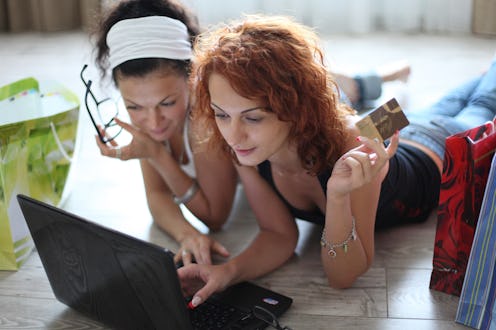Fashion
Millennials Feel Entitled to This Convenience Too

We've all been there — your Amazon shopping cart is hovering at $20.68 and you're trying to decide whether you want Yes, Please enough to buy something worth $5 only to push you into the magic window where you don't have to pay for delivery. You're definitely not alone. In fact, it seems like we now feel entitled to get free shipping. 68 percent of people who shopped online this holiday season didn't pay for the delivery of their items — which is about two billion dollars worth of costs that were footed by the retailers, as reported by Reuters. Free shipping is one of my special phrases these days (not unlike "New Beyoncé Video," or "Free Macaroons"). It literally makes my eyes light up when I see it online. But the expectation of consumers for retailers to cover the costs of getting our goods to us could have negative effects on us in the long term, it seems.Supply chain consultant Steve Osburn told Reuters that companies are losing their profit margins on free shipping: "For most companies, it is a very expensive proposition to try to offer fast and free." So I am the last person to feel sorry for a giant corporation that's not making as much money as it expected to. However, I know that the CEOs of that company aren't likely the ones who are going to suffer the financial repercussions of falling profits: It's going to be us. The prices of things are going to rise, and the working conditions for the people who are doing the actual labor of packing and shipping orders is going to decline. And if the biggest retailers are struggling with these costs, then smaller businesses (who feel they have no choice but to compete with this standard that we've set) must be having an even tougher time.
So where does this leave us as consumers? It seems that it's a difficult spot to be in, especially young adults, students or recent grads who are struggling to find work in this economy. The free shipping is a welcome discount to supplement our already-meager budgets. In an ideal world, we would all go buy from an independent local book store. But we're shopping at a discount on Amazon for a reason.
Sometimes it can feel like consumerism continues to be about getting more even faster, whilst there's another pressure from the opposite side of retail to buy local and handmade. An entire "maker" culture has risen that values creating things slowly — in small-batches with care. Such items are often priced according to the integrity of their materials and the time that it takes to craft them without industrialization. In other words, they're not often very cheap. When we have the means, however, I advocate that we should support smaller operations and the people who make the things we wear, eat, read, listen to, and otherwise consume.
Alicia Frederickson of March & August Underthings, a handmade lingerie line, understands this from both sides of the conundrum because she's a maker herself. "My wage does not allow me to solely buy from other makers," she expresses on her site. "I have chosen to consume less, and to decide carefully on the items I do buy. Even so, I do find this challenging because in this world where how you present yourself is so important (especially in the fashion industry), it is hard to dress how you wish you could, within your budget and your beliefs."
Wanting to express yourself through fashion in the way that we'd like to is not a crime, nor something to feel bad about. Not being able to afford things that are handmade, wanting to shop online, and feeling a twinge of excitement when we get "free shipping" aren't things to be ashamed of either. Almost all of us want to do "better" and shop in a way that we know is "more responsible," but our reality of student loans and mortgages and vet bills can sometimes prevent us from doing so. The low-paying jobs that we have to take (sometimes with corporations who pay a lower-than-living wage to keep costs down, or at underfunded non-profits), keep us from doing that.
So: Let's not shame ourselves or each other for buying bubble bath from CVS instead of an artisanal maker. Let's not feel guilty when our old pants have a hole in them and the only replacement we can afford right now are from a fast-fashion chain. But let's also look for ways that we can slow our fashion down a bit, and ask ourselves whether we really need the same dress in three colors just because it's cheap. Let's start to look at the cost-per-wear of items and determine whether it's cheaper to buy something more expensive but more well-made in the long run. Let's look at the wider implications of our small actions — like not buying things unless they're shipped free — and make the changes where we're able to.
Alicia says she "[does] a lot of thrifting and mixing with handmade items so my wardrobe suits my wants and my needs." Another maker, Andee Penner of Sew Dandee, notes that she's open to unique solutions to make sure her items are accessible to people through bartering or trading: "I'm lucky enough to have some people in my life who are open to trading products, food, services or time which leaves money out of the picture altogether! As a maker, I'm open to discussing this kind of arrangement with anyone who is looking to have me make them something, too as I know most of us don't have a disposable income." And you know what? If you just can't, you just can't. And that's OK.Images: Fotolia, Giphy